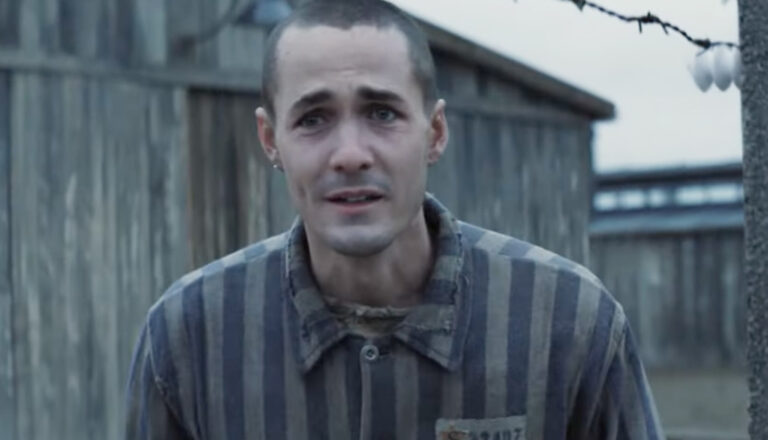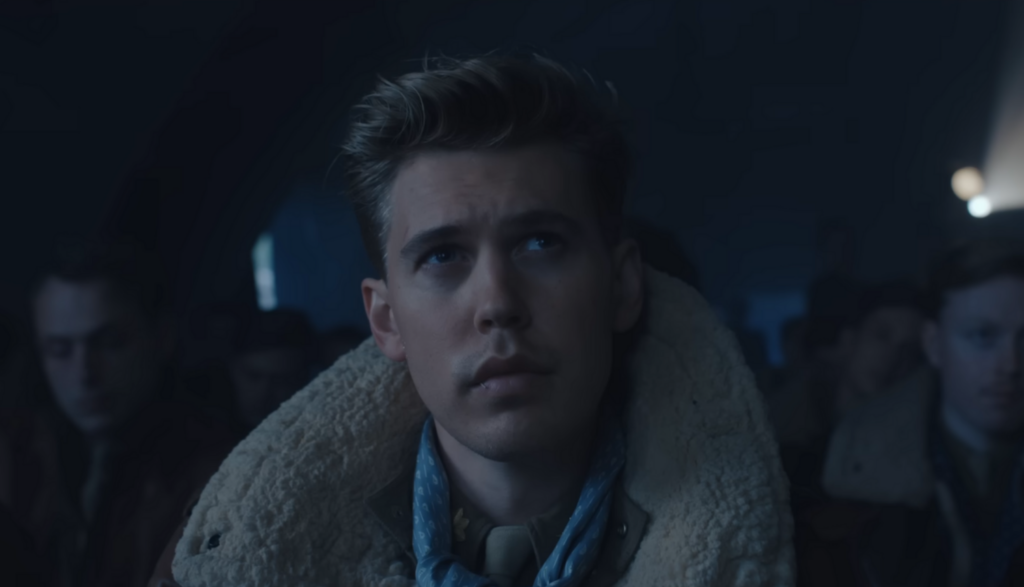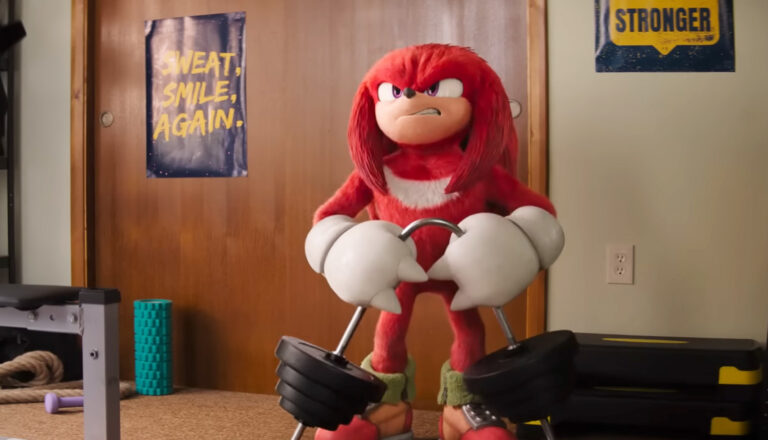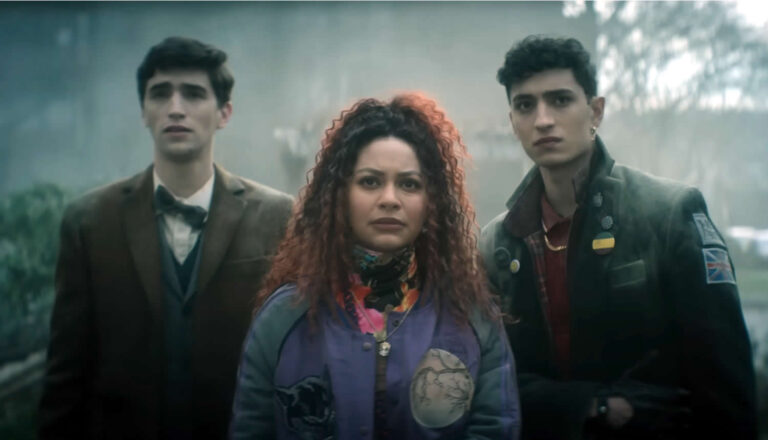
The Tattooist of Auschwitz
The Tattooist of Auschwitz is a little like its titular character. It’s painful. It gets under your skin. And it just might leave a mark.

The B-17 was one of America’s most daunting aircraft in World War II. This heavy bomber boasted four engines, could drop as much as four tons of bombs and carried with it a dozen machine guns that could fire at enemy aircraft from any direction. No wonder the plane was nicknamed the Flying Fortress.
But no matter how many machine guns a bomber could carry, it was still vulnerable to light, fast fighters. A single B-17 was no match for the Messerschmitts and Focke-Wulf fighters it would face. No, the real secret of the B-17’s strength came when they could fly in tight formation, where they’d be able to trap fighters in withering crossfire.
“The key to our survival was flying together,” navigator Lt. Harry Crosby tells us. And flying together was what the 100th Bomb Group was all about.
In Apple TV+’s Masters of the Air, Crosby tells us that officers Gale Cleven and John Egan were the “unquestioned leaders” of the group. They were both Army majors. They were fast friends. And they were nicknamed, respectively and somewhat confusingly, “Buck” and “Bucky.” (“What kind of a name is Gale, anyway?” Bucky jokes about Buck’s real name.)
They were only two of the 350 airmen assigned to the 100th—pilots, copilots, gunners, navigators and radio operators. There were 10 men to each aircraft, 35 planes in all, taking it to the Germans in some of the most dangerous bombing runs in the war. They’d bomb in broad daylight—a strategy that their British allies thought was suicidal. And before the war was over, the group came to be known as the “Bloody Hundredth” due to its heavy losses.
The people who flew for the 100th knew that each mission might be their last. Every morning before a mission, they were served a hearty breakfast with extra rations of bacon, which the fliers came to call the “last supper.” Almost every mission, they’d watch as a fellow B-17 would lose a wing or burst into flame, streaking down to its doom through the clouds.
And even as these few hundred fliers risked their lives in the air, the 100th’s dedicated team of support personnel made sure that the planes could still fly, the wounds could be stitched and psyches might stay relatively intact. Those support personnel might not have racked up Nazi kills. But were they integral to each and every mission? You bet they were.
Director Steven Spielberg and actor Tom Hanks memorably collaborated on 1998’s Saving Private Ryan, considered by many to be one of the greatest war movies ever. But they seem to share a fascination with World War II, and they’ve continued their collaboration behind the camera.
The two served as executive producers for Band of Brothers, the wildly acclaimed, Emmy-winning 2001 HBO miniseries. Their next WWII project, The Pacific, won plenty of praise—even if the graphic imagery shocked and even sickened some.
Masters of the Air is the third miniseries in this Spielberg/Hanks partnership—and the first to land on Apple TV+, not HBO. With its makers reportedly spending $250 million to create the show, this historical drama seeks, once again, to give audiences a realistic perspective on another aspect of what some have dubbed “The Good War.”
In a sense, wars are never “good.” They may be just. They may be necessary. But for those fighting in them? They often are horrific. And while Masters of the Air may avoid the ground-based carnage of Band of Brothers’ Battle of the Bulge or the terrible bloodshed in The Pacific’s Peleiu, the human meat grinder of war still works in the sky, too.
Planes get shot down and blown up, of course. Bullets blast through many an aircraft’s fuselage, finding their mark in flesh and blood. We see injuries we’d not necessarily expect: Flying at high altitude where the temperature can be well below zero, combatants can suffer frostbite—including on their legs and buttocks after they urinate in fear. Airsickness mingled with anxiety cause many a man to vomit.
Masters of the Air does not turn a blind eye to war’s atrocities. Nor does it turn its ear away from the brutal profanity we’d expect to hear in panicked, life-or-death situations.
But while this miniseries certainly comes with plenty of cautions, it isn’t just about blood. It’s also about heart.
Despite the cold, the airsickness, the constant threat of death and horrible injury, the men we see here have a job to do—and rarely do they shy away from doing it. Not only are these airmen committed to the task at hand, they’re also deeply committed to each other. They kid. They fight. But most will risk their lives to save someone else’s skin—demonstrating creativity and courage in moments of crisis.
Masters of the Air is a realistic depiction of wartime loss and trauma—this time from a bird’s eye view. But even as it shows us the horrors of war, it gives us some real heroes, too.
Major Gale “Buck” Cleven arrives in England, and a number of other fliers arrive in East Anglia, England, as part of the U.S. 100th Bomb Group. But his tour starts inauspiciously with a failed bombing run.
The entire group was sent to drop ordnance on the German U-boat yards in Bremen, but poor visibility hampered the mission. We see multiple planes plummet to earth in flames. Individual soldiers are injured, too. Afterward, Buck looks at his plane, pocked with gigantic bullet holes, and marvels. “Why didn’t you tell me [what it was like]?” he asks his friend, “Bucky” Egan.
Bucky had indeed been on a couple of missions weeks before. In fact, he was forced to treat a wounded, blood-covered man aboard the plane—at one point protecting the guy with his own body when another enemy aircraft repeatedly strafes his B-17. The pilot on the mission, his face dotted with blood, talks with Bucky afterward. “Wondering what to tell your guys?” he asks. “Don’t say anything. They’ll figure it out. We all do.”
Another plane is forced to make a belly landing (sans landing gear) in a grass-filled field. The occupants make a mad dash once the plane’s on the ground, knowing there’s a danger the bomber could blow up. Someone suffers frostbite on his hands when he’s forced to grab a machine gun with his bare hands. Harry Crosby, a navigator (and the miniseries’ narrator) suffers from horrific airsickness, and we hear him repeatedly vomit into a paper bag. (“Your stomach’s got to be as empty as our fuel tank,” someone tells him.) Some of the vomit gets on another man’s coat. Another man, clearly sick with something more serious, throws up blood.
Soldiers flirt with women before heading off to the European front. One canoodles with his girl. A man and a woman make out, falling out of the focus of the camera. Men drink heavily, and we hear that Bucky broke a bar’s treasured narwhal tusk while drunkenly singing. Bucky makes a bet that a man (who seems to have off-centered eyes) can hit an apple with a dart—while the apple is on his head. Characters smoke cigarettes.
A man tells Buck that he’s “blessed to have you on our plane, sir. I feel the spirit of God in you.” Buck tells him, “In all of us.” (That same man later prays passionately inside the aircraft when he feels his life is in jeopardy.) Characters make crude jokes and comments throughout. We hear the f-word eight times, the s-word 10 times and plenty of other profanities, including “b–ch,” “b–tard,” “d–n” and “h—.” God’s name is paired with “d–n” four times, and Jesus’ name is abused five.
Weeks after the group’s first failed mission, the 100th prepares to attack a Nazi plant in Norway. It’s a far more successful mission. But when Lt. Curtis Bidding’s plane suffers a great deal of engine damage, the rest of the group must scramble to try to get Curtis and his crew back to the base safely.
The episode opens with the grim failure of the Bremen mission: We’re told that 66 men didn’t make it home. One airman who did survive suffered frostbite on his buttocks—the result of his own urine freezing to his skin in 50-below temperatures. (We see the injury, as well as the bandaged hands of another frostbite victim.) A plane crashes in the distance—the result, we later hear, of a training accident.
A drunk Bucky asks Curtis to hit him in the face. Curtis eventually obliges. Curtis later punches a British serviceman who questions the wisdom of the U.S. daytime bombing runs. (Britain bombs its targets at night—a safer but more destructive and indiscriminate practice.) Crosby again suffers from bad airsickness—vomiting into a helmet and, in a moment of panic, accidentally slapping the full helmet onto his head. (He feels the mess trickle down his face, and he at first believes he’s been shot.)
We hear references to venereal diseases, and some British servicemen quip that the American men on the other side of the table are involved in “heavy petting”. We see people gamble and drink heavily. When Bucky’s called in to meet his new commanding officer, the officer asks Bucky if he’s hung over. “No sir,” Bucky says. “That won’t come for another couple hours.” A man puts a helmet around his crotch when his bomber begins its run, muttering about “protecting the goods.” Soldiers leer at and flirt with women. There’s a joke about two men spooning.
Characters use the f-word once, the s-word five times and utter several other vulgarities, including “b–ch,” “b–tard,” “d–n,” “h—,” “p–s” and “pr–k.” God’s name is misused five times (twice with the word “d–n”), and Jesus’ name is abused five times.


Paul Asay has been part of the Plugged In staff since 2007, watching and reviewing roughly 15 quintillion movies and television shows. He’s written for a number of other publications, too, including Time, The Washington Post and Christianity Today. The author of several books, Paul loves to find spirituality in unexpected places, including popular entertainment, and he loves all things superhero. His vices include James Bond films, Mountain Dew and terrible B-grade movies. He’s married, has two children and a neurotic dog, runs marathons on occasion and hopes to someday own his own tuxedo. Feel free to follow him on Twitter @AsayPaul.

The Tattooist of Auschwitz is a little like its titular character. It’s painful. It gets under your skin. And it just might leave a mark.

The Sonic spinoff blends explosive adventure and road-trip-buddy-comedy into a fun romp for both kids and diehard fans.

Dead Boy Detectives targets teens in style and story. But it comes with very adult, problematic content.